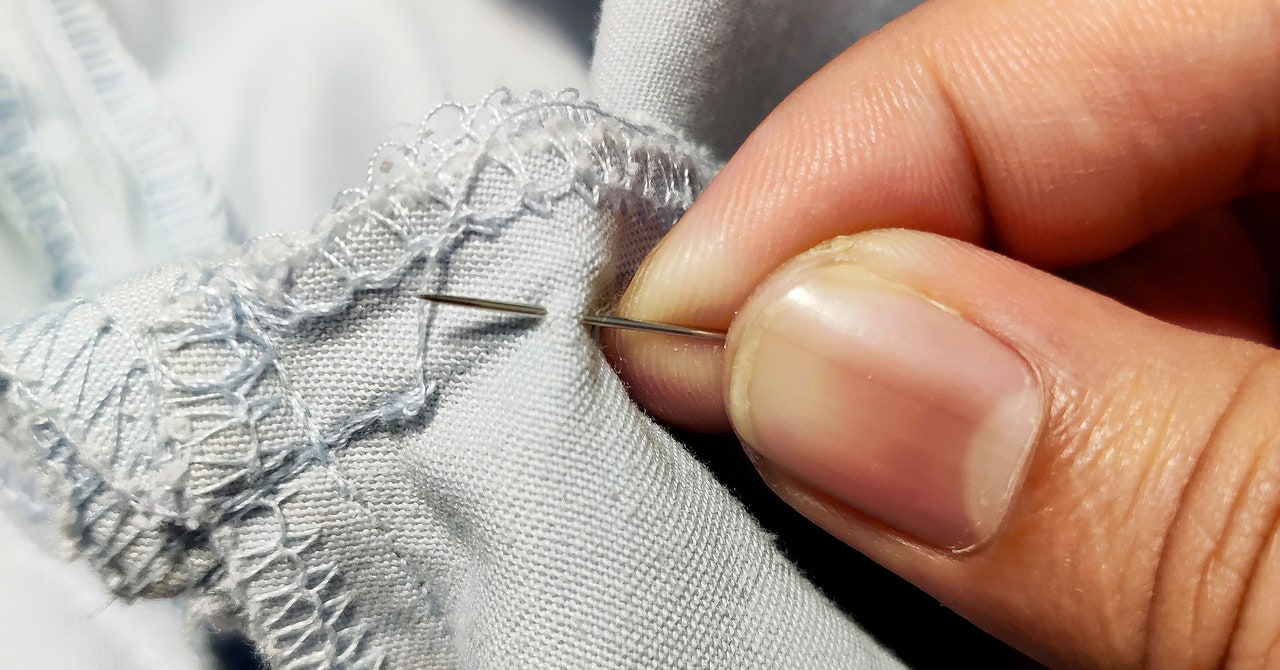It started with a thrift store off London’s Portobello Road, and the perfect pinstripe suit. Well, almost perfect. “I absolutely loved it, but it didn’t suit me. So I came up with the idea of building an app,” explains Josephine Philips, the founder of Sojo, a start-up that aims to bring tailoring “into the modern age”.
Nicknamed “the Deliveroo of fashion repairs”, Sojo launched in January 2021 and connects users with nearby seamstresses while facilitating collection and return of clothing using a network of couriers. Independent seamstresses register on the app and set their own price for their work, from fixing holes to changing sizes, with Sojo charging a 30 percent fee. That same pinstripe suit ended up being one of the app’s first orders.
“I’ve had the experience of going to a tailor, and it was so archaic, it was really backward,” says Philips. “It is not an activity that is common, and we want to make it common. We want every young person to be busy with repairs and renovations.” It’s a problem made all the worse by the fact that two-thirds of repairable clothing is thrown away.
Eighteen months after launching, Sojo is a different beast, fresh off another $2.4 million round of funding, a partnership with Scandinavian fashion brand Ganni and a hiring campaign that should see it reach 16 staff. It has also been a landslide for Philips. The 24-year-old started working full-time at Sojo right after graduating – her only previous jobs were as a waitress and as a summer intern at second hand clothing exchange Depop.
For the first few months, Sojo was a one-woman show, driven mainly by a mix of overwork and youthful passion to change the “culture of waste” and “exploitation” that characterizes the fast fashion industry, from which Philips launched its first , limited network of couriers and seamstresses.
“That childhood meant seeing how the system worked and thinking, ‘I can really change that’… That kind of view was definitely a superpower,” says Philips. “But there was a lot going on. Because I had never done anything like this before, I was learning and busy at the same time.”
As a black female founder, Philips found itself in an industry where female-led startups accounted for just 2.8 percent of VC funding. According to one report, between 2009 and 2019, even one black female founder in the UK raised any Series A funding.
“Everyone knows the venture capital space for underrepresented founders… The numbers speak for themselves,” says Philips, explaining that she would regularly be turned down by investors, only to see white male counterparts with little more than “a PowerPoint” pitch and “get millions right off the bat.”
Eventually, Sojo was able to secure backers, initially through an angelic round with a series of major investors, including Depop founder Simon Beckerman. The final Series A round was led by female-led VC firm CapitalT.
External financing has also led to a change of focus – a more pragmatic, but no less effective version of Philips’ vision. Instead of direct-to-consumer activities, Sojo is increasingly focusing on business-to-business: closing deals with major fashion brands such as Ganni (alongside seven other partnerships in the pipeline) to be the supplier of changes for its thousands of customers. These deals allow customers to easily request garment repairs and alterations from Sojo’s seamstresses, and usefully change the way they view tailoring.
“I realized that by shifting our business model to working with brands, we could actually scale and make an impact much faster,” explains Philips. “One of our investors said you can spend £10 million to get 10 million direct customers over a 10-year period. Or you can have one B2B partner and get access to 10 million customers in one day.”
Philips is also outsourcing Sojo’s courier network and hiring its own seamstresses. She’s even explored whether Sojo could offer its own “dark kitchen” equivalents; a network of industrial sewing workshops that would give it the scale to work on thousands of alterations locally at once.
Philips hopes that Sojo will change consumer attitudes towards clothing at a time when fast fashion is in the spotlight due to its impact on the environment. “Ultimately, we live in a culture of hyper-disposability,” she says. “Clothes were not considered anything of value.”
This article was originally published in the November/December 2022 issue of WIRED UK magazine.

